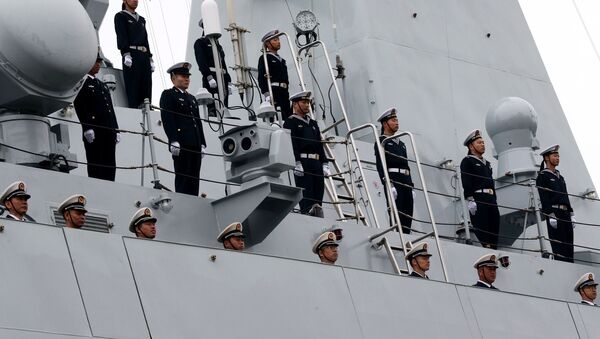On Monday, Russian and Chinese warships kicked off the active naval stage of the Maritime Cooperation 2017 drills in the Baltic Sea, with training set to continue all week until Friday, July 28.
The Chinese naval group, which includes the Hefei guided missile destroyer, the Yuncheng frigate and the Lomahu supply ship, entered the Russian Navy port of Baltiysk on Friday, becoming the first Chinese naval group to pay a visit to the Baltic Sea.
In total, about 10 ships, including the Russian corvettes Steregushchiy and Boikiy, over a dozen planes and helicopters and hundreds of sailors are involved in the drills, which include training in anti-ship, anti-sub and anti-aircraft defense, as well as sea lane defense, search and rescue and anti-piracy operations. These are the first naval exercises the two countries hold in the Baltic Sea.
After completing the active phase of the exercises, Russia invited Chinese vessels to travel to St. Petersburg to take part in celebrations marking Russia’s Navy Day, which falls on the last Sunday of July.
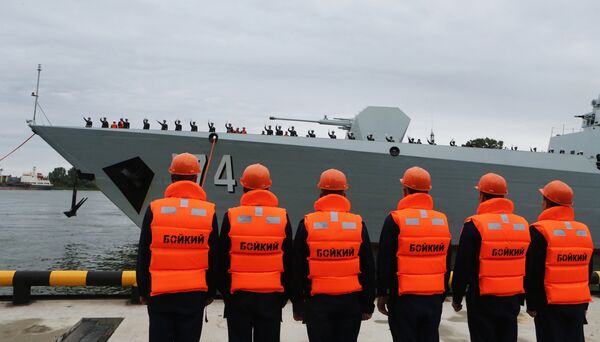
The detachment of Chinese warships will arrive in St. Petersburg on July 28 and will be open for visitors during their stay.
Vice Admiral Alexander Fedotenkov, the deputy commander of the Russian Navy, said that the upcoming maneuvers and further participation of Chinese vessels in Russia's celebrations mark a new stage in maritime cooperation between the navies of the two countries.
"The Baltic Sea is an absolutely new area for Chinese sailors. Their sea passage is already an achievement in itself, it took them 40 days to come here. The Baltics has its own specifics: busy navigation, complexity of maneuvering. It requires close cooperation, a setup of a joint navigation system. Plus we are practicing new techniques of tactic cooperation. It is a new stage of our communication," Alexander Fedotenkov said.
"The trend for the development of Chinese-Russian relations has been excellent in recent years, and favorable progress can be noted in military cooperation, as well," the analyst said.
"Earlier, the two countries conducted drills in various areas of the Pacific Ocean. This time, the joint exercises in the Baltic Sea reflect the close cooperation between the two countries in the military sphere – their mutual strategic support for one another."
The drills, the analyst stressed, are "not directed against any third country. At the same time, they act as a strategic deterrent against any potential aggression. The current drills in the Baltic Sea show the world that such drills could be held anywhere when the security interests of the two countries are affected." Furthermore, "the exercises demonstrate the level of mutual trust between the two countries."
According to Konstantin Sivkov, a military observer and director of the Academy of Geopolitical Problems, the deployment of Chinese battleships at such a long distance for joint military drills signals an unprecedented readiness to cooperate with Moscow in preventing joint maritime security threats.
The expert also noted that the drills are being held in an area of continuous presence of NATO warships.
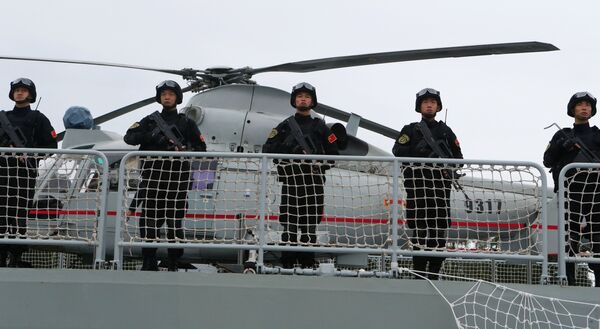
"It is absolutely clear that while NATO warships have anchored in the Baltic Sea, Russia and China demonstrate that they are unified front, unified battle-order. The drills reflect the readiness of the two countries to support each other and act jointly. Accusations by Western powers of the 'aggressive nature' of the drills ring hollow to Russia and China," he said.
"As for the fact that NATO is going to monitor these exercises – that is their right. The drills are one of the three pillars of Russian-Chinese relations. They confirm Beijing's willingness to cooperate with Moscow in every area, including in the field of maritime security."
Last week, as the three Chinese warships crossed Danish waters on their way to the Baltic Sea, Danish international affairs observer Flemming Splidsboel Hansen told Danish media that the Russian-Chinese exercises carry an "aggressive" character, and mark a new escalation in Moscow's conflict with NATO.
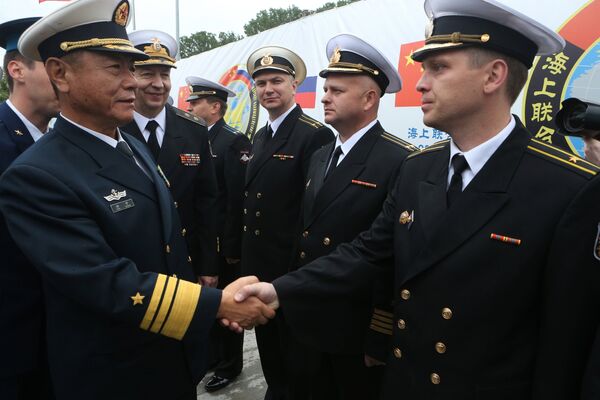
Igor Korotchenko, editor-in-chief of National Defense, a Russian military affairs magazine, told Sputnik that Hansen's remarks echo the policy of the leaders of the US and NATO, "who are not used to the idea that someone other than themselves can have their own national interests in various territories or sea areas around the world."
"Carrying out the Russian-Chinese naval drills is exclusively an internal matter between Russia and China," the expert stressed. "Naturally, we do not threaten anyone, [but] working out tasks related to combating international piracy, terrorism and protecting our national interests [is our priority]."
In other words, Korotchenko stressed, "Russia and China will conduct exercises wherever they find it necessary to do so, and will not consult with anyone about it. China is acting in full accordance with the norms of international law, and conducting exercises wherever its interests require it. In the current case, their interests coincide with Russia's national interests. … So Denmark, and NATO as a whole, should calm down. They cannot influence these processes anyway. If they want to be hysterical … they can do so. But this will have no impact on Moscow and Beijing's sovereign decisions."
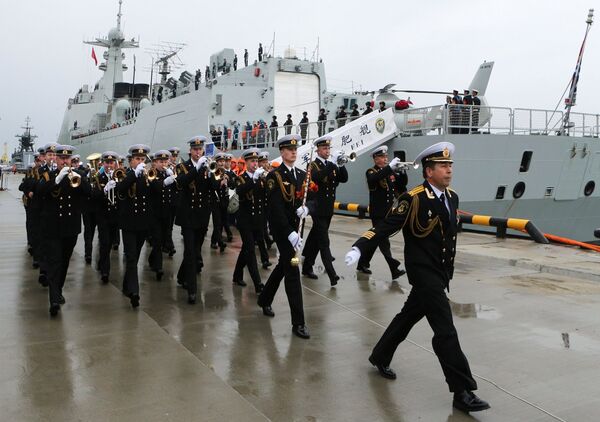
Maritime Cooperation 2017 drills in the Baltics are a strong signal to NATO that it can't dominate in this region and other key areas of the World Ocean, he said. The joint exercises are aimed at fully aligning Russia and China's guidance systems, which will enable the mariners of the two countries to provide assistance to each other and to merchant vessels in any area of the World Ocean.
Dr Ma Bin, assistant professor of the Center for Russia and Central Asia Studies at the Shanghai-based Fudan University told Sputnik that joint military drills are very important for ensuring effective military cooperation between the two countires. The fact that the geography of the joint exercises is expanding and that they are being held in the zones of existing conflicts provokes different interpretations of the aims of these drills.
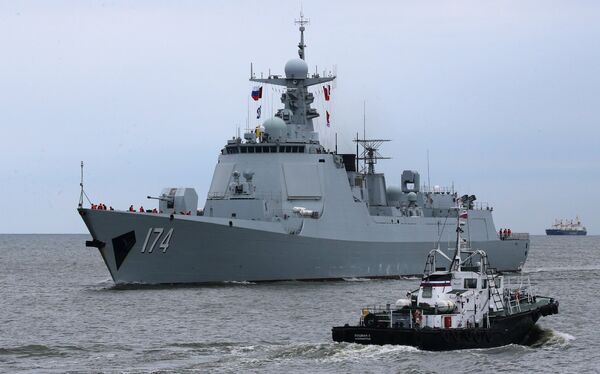
The two countries, the expert noted, have already held joint drills in the East China and the South China Seas. Hence the current exercises in the Baltic Sea are perceived as China's support of Russia in its confrontation with NATO.
However the current maneuvers do not go beyond the limits of a "comprehensive partnership in strategic cooperation" and are aimed at strengthening this strategic partnership and mutual trust and have very limited impact on geopolitics, Dr Ma Bin concluded.

